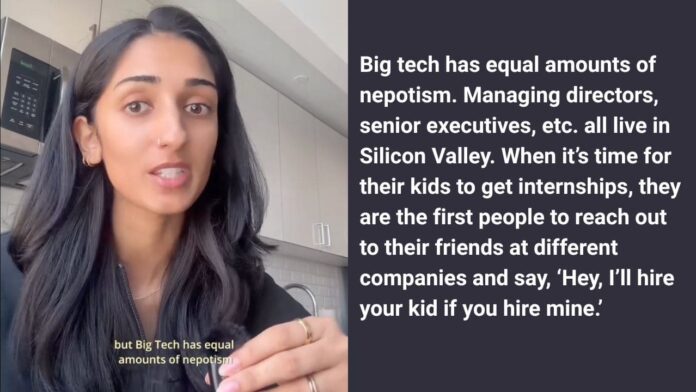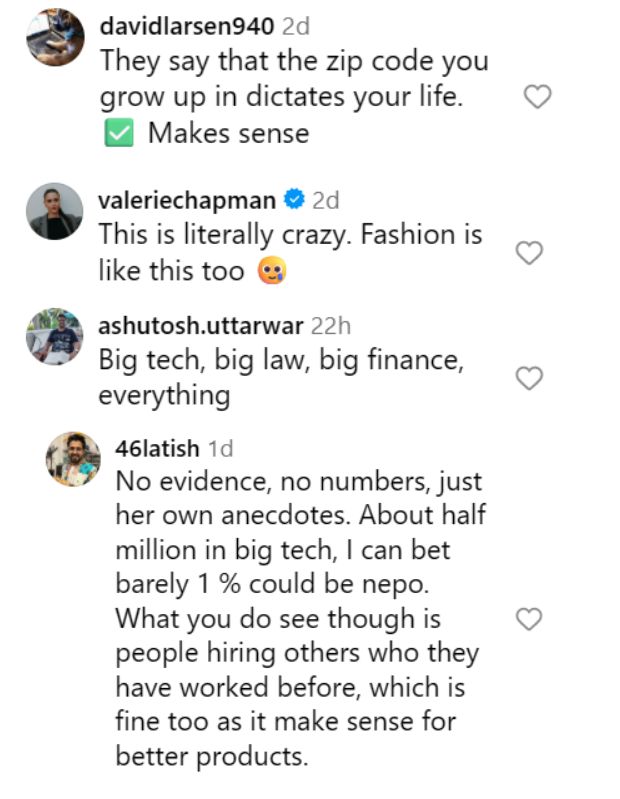
In a world where connections often trump talent, nepotism in IT industry is emerging as a hot-button issue, much like the ongoing debates around nepotism in Bollywood. While many assume tech giants like Microsoft hire purely on merit, a recent viral video from a Microsoft software engineer is shattering that illusion. Ume Habiba, a talented developer at the tech powerhouse, took to Instagram to expose how corporate nepotism in big companies plays out behind closed doors. Her candid revelations have sparked widespread discussions on fairness, equality, and how favoritism hinders growth in sectors from politics and entertainment to education and sports. As India grapples with this pervasive problem, stories like Ume’s highlight why unregulated nepotism threatens national progress and discourages hardworking youth.

We all know nepotism exists—whether it’s subtle favoritism in family businesses or blatant in high-profile fields. But in a patriarchal society like India, where relationships hold sway, it often undermines meritocracy. Recently, the spotlight has intensified on nepotism in tech companies, with individuals from various walks of life sharing real-world examples. Ume’s story from the IT sector challenges the myth that tech is immune, proving that even in supposedly merit-based environments, connections can pave the way.
Ume Habiba’s Viral Video: How Nepotism Thrives in Big Tech
Ume Habiba, a software engineer at Microsoft, dropped a bombshell in her Instagram video, pulling back the curtain on nepotism in big tech companies. She explained how high-level executives—managing directors and senior leaders living in Silicon Valley—leverage their networks to secure spots for their kids. Ume broke it down simply:
“Big tech has equal amounts of nepotism. Managing directors, senior executives, etc. all live in Silicon Valley. When it’s time for their kids to get internships, they are the first people to reach out to their friends at different companies and say, ‘Hey, I’ll hire your kid if you hire mine.’”
She didn’t stop there. Ume pointed out how these privileged individuals often skip rigorous hiring processes, landing roles without proving their skills. In her words:
“These kids, who don’t have the best skills, whether they’re hard skills or soft skills, make it to these big tech companies because of corporate nepotism. These kids often get to bypass the interview process in order to get their first full-time job.”
Her video isn’t just talk—it’s a wake-up call on how nepotism in IT sector allows underqualified candidates to breeze through non-technical interviews or avoid them altogether, leaving truly talented applicants in the dust.
Watch Ume Habiba’s Original Instagram Video on Corporate Nepotism
The video, shared on Ume’s Instagram handle (@umxe), quickly went viral, amassing views and shares as people resonated with her insights. If you’re curious about the full rundown on nepotism in tech industry, check it out below—it’s a raw look at the hidden dynamics in corporate hiring.
Netizens’ Reactions: Mixed Views on Nepotism in Tech and Beyond
Ume’s expose ignited a firestorm online, with her video spreading like wildfire across social media. Netizens flooded the comments with their takes, many agreeing that corporate nepotism isn’t limited to tech—it’s rampant in other industries too. Some shared personal stories of working alongside less-qualified colleagues hired through connections, while others downplayed it, arguing nepotism affects only a small slice of the workforce.


Here are a few standout reactions:
- One user commented: “This is so true! I’ve seen it in my company—kids of execs get easy passes while we grind through interviews.”
- Another added: “Nepotism in Bollywood gets all the hate, but big companies are no different. Time for change!”
- A skeptic noted: “It’s minor in tech; most hires are merit-based. But yeah, it happens.”
These responses reflect a broader frustration: while moderate nepotism might stem from India’s family-oriented culture, its unchecked spread erodes trust, stifles innovation, and perpetuates inequality.
The Bigger Picture: Why Nepotism in IT and Other Fields Hurts India
Stories like Ume Habiba’s aren’t just disheartening—they’re a red flag for the younger generation hustling to build a better future. Nepotism in big companies discourages merit, limits opportunities for deserving talent, and slows national growth. In fields like politics, business, entertainment, education, and sports, favoritism based on connections over competence creates barriers. For India to thrive, we need reforms: transparent hiring, equal access, and competitions rooted in skills, not surnames.
What’s your experience with nepotism in IT industry or elsewhere? Have you seen it firsthand? Drop your thoughts in the comments—we’re all ears!
